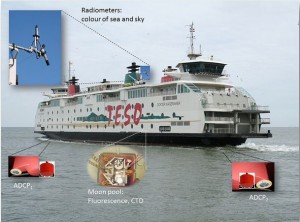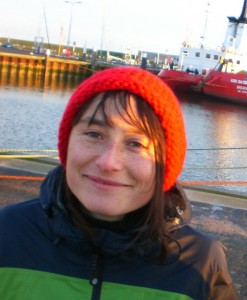Earlier this year we ran the first ever I’m a Geoscientist, Get me out of here! event, an online chat-based game show in which school kids vote for their favourite geoscience communicators. In this week’s GeoTalk, Sara Mynott talks to Anna Rabitti, an oceanography PhD student and winner of this year’s I’m a Geoscientist…
First, for those who haven’t been following I’m a Geoscientist, can you tell us a little about yourself and what made you decide to take part in the competition?
My name is Anna, I am Italian, and I moved to a tiny Dutch Island in the North Sea almost five years ago (after getting my masters in Physics) to work on my PhD project in physical oceanography at the Royal Netherlands Institute for Sea Research, NIOZ.
My PhD project is about internal waves in the equatorial ocean, and how they may interact with the peculiar ocean dynamics at the equator. I use observations of current speed, temperature and salinity from the deep equatorial Atlantic, as well as other analytical tools to find out more about internal waves in confined basins. In the last year I have been also involved in a big European project called MIDAS, helping to characterise the oceanographic conditions of sites that could suitable for deep-sea mining.
I have always liked to share the things I learn and work with people who are not directly involved in science – I see it as compelling responsibility to society. However in the last few years it has been very difficult for me to fulfil this desire as I live in a foreign country whose language I do not really master.
That is why, when I saw the I’m a Geoscientist initiative advertised by the EGU, I did not hesitate to apply for it. It is in English, you can do it from your office, and it gives you the opportunity to be in contact with many kids and teachers from different countries. It is really a great educational experience, for all sides.
Have you done any geoscience outreach before?
In the past, I have been involved in initiatives to promote scientific thinking as a tool that every citizen can use to make conscious social and economic choices. However, I have never really focused only on geoscience before. So far, my experience has been limited to classic public debates and workshops and I’m a Geoscientist was the first time I’ve had the opportunity to interact with so many people through online chats and forums.
What was your toughest question during the competition and how did you respond?
Any of the questions that involved ethical or moral choices. For example this one: “Don’t you think that if a person was to cut a whole tree off, then they have to plant 10 more trees so that the levels of global warming can decrease?”
I am sure that this was asked with the best intentions, and that the student asking this was really willing to positively act to mitigate human induced climate change. However, I found it hard to explain the importance of reconsidering our attitude towards the exploitation of natural resources.
Why, first of all, did the person cut that tree? We are experiencing a very difficult time in human history, when access to resources like fossil fuels and water are the causes of social and economic tension. By the time those ten trees have grown, it might be too late to change our habits. These are very delicate and important issues. Explaining them is crucial, since the actual situation is definitely asking for immediate action, but is also very challenging – especially when you do not have your audience in front of you and you cannot appreciate their reaction immediately. I really hope I succeeded in communicating the urgency of the issue, without scaring the students too much.
What was the question you appreciated the most?
We received so many good questions from the students, some of them very challenging, from life on our (and other) planets to what it is like to travel at the speed of light; from the role of waves in the ocean to the mitigation of earthquake hazards. However, if I have to pick one, I guess I will vote for “How do you know what it is inside of our planet, if no one has ever been there? Suppositions?”.
I find it a very direct and honest question, driven by pure scientific curiosity – I see a brilliant scientific mind behind it!
Among the non-scientific questions we received, I would definitely go for the question asking if Atlantis ever existed. There’s been no scientific proof of Atlantis so far, but my advice is to keep an eye open when sailing on the Atlantic Ocean… you never know what you might find! Students need to know that scientists are allowed to have dreams too.

The ferry between Den Helder and the island of Texel, where the Royal Netherlands Institute for Sea Research, NIOZ, is located. The ferry is equipped with scientific instruments measuring, at each crossing, several properties of the water: temperature and salinity via the CTD (Conductivity, Temperature and Depth sensor), velocity via the two ADCPs (Acoustic Doppler Current Profilers) and colour of the sea and sky via the on-board radiometers. Data are then displayed in real time to all passengers thanks to two screens on the main deck. (Credit: Eric Wagemaakers)
You’re the lucky winner of 500 euros, how do you hope to spend it?
The island where my research institute (NIOZ) is located and the mainland are connected with a ferry service that sails every half hour. Since 1998 the ferry has been equipped with scientific instruments that take measurements of current velocity, temperature, salinity and other parameters of the water, such as suspended matter and chlorophyll content, every time the ship crosses the channel. These data are used by my colleagues here at the institute to monitor and understand the delicate ecosystem of the Dutch Wadden Sea, but they are also displayed in real time to passengers on two huge screens.
The institute’s other scientific activities are also shown, as well as pictures taken during research cruises or laboratory or field experiments – I think this is a very effective outreach activity, since it shows citizens, locals and tourists that someone is studying the sea right there, and right then, and that they can be proud of having such an institute on this tiny island.
Highlights of scientific findings are shown to the public with simple pictures: once on dry land, they will perhaps think about the science behind waves, seals, local fish and seaweed, and about the delicate balance that links all these elements together.
Back to the prize. In late 2015 a new ship will start sailing along with the old one. Building a big ship, as you can imagine, takes a lot of time, and we are already planning which instruments, display screens and facilities will be put on board, continuing and improving this precious time series. I thought to add the prize to the money already invested for the scientific equipment on the upcoming new ferry. Unfortunately, no oceanographic instrument can be purchased with 500 euros (they are expensive!), but a new, possibly interactive way to display the measurements to the passengers (an extra screen? An interactive tablet to surf the real time data?) could work.
What’s your top tip for aspiring geoscientists?
Being at the beginning of my career, I consider myself an aspiring geoscientist too, therefore a tip, but also a reminder to myself, could be: being a (geo)scientist is a job like many others, so be professional and make sure you are treated professionally. Being passionate about what you do as a job is sometimes dangerous, because the line between hobby and job gets blurred, and you are likely to give up some work rights with the excuse of “doing what you like”.
It is important then to remember that being a good scientist is a challenging task, it requires time, imagination and discipline (and, often, money). It follows that good working conditions and at least some job security are at the base of good science, but these things are aren’t always available in the academic system. It is the responsibility of the whole scientific community to improve this situation, not only for the scientists of today, but also for those aspiring (geo)scientists that will make up the community tomorrow.
Would you recommend taking part to I’m a Geoscientist to your colleagues?
Sure, no doubt about it! If you are interested in scientific outreach and in the interaction between science and society, I think I’m a Geoscientist can be a very good starting point: it asks you for only two weeks of your time, and a few hours per day, and you do not have to move from your office.
In turn, it gives you the opportunity to interact with many students and teachers from all over the world, as well as with the other scientists taking part to the initiative, and helps you to form opinions about so many different topics that you will surely learn a lot yourself. I would definitely recommend it to scientists of all ages: I think students would also largely benefit from the interaction with scientists at different stages of their careers.
By Sara Mynott, former EGU Communications Officer, as of September Phd student in marine biology at the University of Exeter.


Pingback: GeoLog | Connecting Earth scientists and school students – Apply to take part in I’m a Geoscientist!